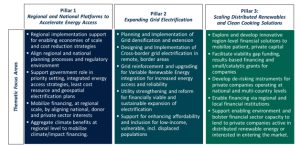- Introduction
COMESA and the World Bank signed a Financing Agreement for the implementation of the Accelerating Sustainable & Clean Energy Access Transformation (ASCENT) in AFE Region Multi-Phase Programmatic Approach (MPA) in December, 2023. The ASCENT Program design reflects the evolution of the World Bank to deliver solutions and impacts at scale. ASCENT integrates key elements of the new vision expressed in the World Bank’s Evolution:
- adopting an augmented country engagement approach that yields development outcomes at community, national, regional, and global levels;
- exploiting synergies from the mobilization of domestic revenues, private capital, and climate financing, while combining traditional and innovative instruments; and
- fully leveraging the potential of World Bank institutions, while also harnessing partnerships, recognizing that no single institution can meet the financing needs of ASCENT and that strategic concessional financing must be deployed to maximize impact.
ASCENT’s MPA will form an important part of the proposed Energy Transition and Access (ETA) Global Challenge Program (GCP), which is under development as a response to eight global challenges identified as priorities in the World Bank Evolution. The ETA GCP will aim at increasing access to affordable, reliable, sustainable, and modern energy by scaling up clean energy, phasing down fossil-fuel use, and supporting a just transition. The ASCENT MPA consists of three Pillars, namely: Regional and National Platforms to Accelerate Energy Access, Expanding Grid Electrification, and Scaling Distributed Renewables and Clean Cooking Solutions.

The ASCENT Program will accelerate access to electricity, with an estimated 100 million people across 20 countries in Eastern and Southern Africa expected to benefit in the next seven years. The Program intends to align the comparative advantage of all parts of the World Bank (IDA, IFC, MIGA) and build on the IDA financing envelope of US$5 billion to leverage US$10 billion from public and private financing through strategic partnerships. This program is an ambitious leap towards universal energy access and clean energy transition in Sub-Saharan Africa.
2. ASCENT COMESA Platform
COMESA will implement Pillar1, which is a $50 million regional platform consisting of the following components:
- Component 1: Digital Monitoring, Reporting and Verification (D-MRV) Platforms for Energy Access and Climate Finance
The Project will support countries with adoption of digital monitoring and verification (D-MRV) platforms and other digital tools to facilitate better and faster planning, implementation, monitoring, reporting and verification of their energy access efforts and enable access to climate financing, including through their participation in carbon markets.
- Component 2: Project Preparation Facility
The Project Preparation Facility (PPF) is one of the critical components of ASCENT, which will support governments and the private sector to develop bankable, investment-ready Projects through a demand-driven approach. This component has three sub-components which are: Sub-component 2A: National agencies Project; Sub-component 2B: Cross-border solutions; and Sub-component 2C: Private sector distributed renewable energy (DRE) companies.
- Component 3: Advisory support to governments on planning, policy regulation and finance mobilization
This component will support participating countries on strengthening the policy and regulatory environment for energy access.
- Component 4: Knowledge exchange, convening, data, skills development and consumer engagement
This component will enable participating countries to share both technical knowledge and experiences of energy access interventions, allowing countries with large energy access deficits to learn from faster-electrifying countries in the region, through regional and bilateral knowledge exchanges and workshops for governments, private sector, development partners, etc.
- Component 5: Project management and capacity building support to PIU
This component will provide specific support to building the capacity of the COMESA PIU for the implementation and monitoring of the activities under the regional platform.
The ASCENT project has developed guidelines and procedures for the operation of the project as follows:
- The Grievance Redress Mechanism (GRM) which is aimed at facilitating awareness and resolution of complaints and grievances about the regional platform of the ASCENT project, implemented by COMESA. The GRM can be accessed here
- The Stakeholder Engagement Plan which can be accessed here
- The Labour Management Procedures (LMP) which can be accessed here
- COMESA Environment and Social Commitment Plan which can be accessed here




